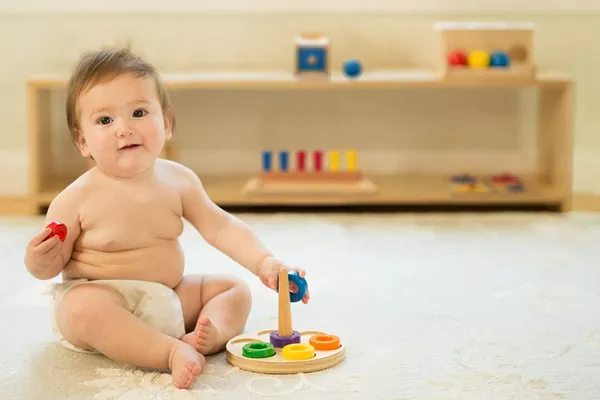As parents, we often wonder when our child’s learning journey begins. Some people might think that learning only starts when children go to school, but research has shown that infants and toddlers have the capacity to learn and develop important skills from a very young age. In fact, 1-year-olds are capable of learning and acquiring skills that will impact their entire life. Let’s explore the different areas of development in which 1-year-olds can learn.
Language Development:
One-year-olds are capable of understanding simple words and phrases and can communicate their basic needs through gestures and sounds. They are also capable of learning new words and expanding their vocabulary at a rapid pace. At this age, children are like sponges, absorbing everything they hear and see around them. Parents can help with language development by talking to their child frequently, reading books together, and exposing them to different languages. Research shows that bilingualism can have cognitive and socio-cultural benefits for children, so exposing them to more than one language from a young age can have a positive impact on their development.
Social Development:
One-year-olds are learning important social skills such as sharing, taking turns, and playing with others. They are also developing emotional intelligence by recognizing different emotions and responding appropriately. Social development is critical for children to thrive in school and later in life. Parents can encourage social development by arranging playdates with other children, modeling positive behaviors, and providing opportunities for their child to interact with others. One important aspect of social development is learning empathy and compassion. Parents can model this behavior by showing care and concern for others and acknowledging their child’s emotions.
Cognitive Development:
One-year-olds are constantly exploring their environment and learning through trial and error. They are developing their problem-solving skills by experimenting with different objects and figuring out how they work. Parents can promote cognitive development by providing their child with safe and age-appropriate toys that encourage exploration and problem-solving. For example, simple puzzles or blocks can help children learn about shapes, sizes, and spatial relationships. Parents can also help their child develop memory skills by playing games such as “peek-a-boo” or “where’s the toy?”
Physical Development:
One-year-olds are rapidly developing their gross and fine motor skills. They are learning to crawl, stand, and walk, and are refining their hand-eye coordination. Parents can support physical development by providing opportunities for their child to move and explore, such as playing with balls, climbing on age-appropriate structures, and practicing simple activities like stacking blocks. Outdoor play is also important for physical development, as it helps children develop their balance, coordination, and strength.
Emotional Development:
One-year-olds are learning to express and regulate their emotions. They are discovering that they can have an impact on the world around them and are developing a sense of self. Emotional development is critical for children to develop resilience and cope with stress later in life. Parents can support emotional development by providing a nurturing and safe environment, responding to their child’s needs and emotions, and helping them to learn healthy ways to express their feelings. For example, parents can encourage their child to talk about their emotions and validate their feelings.
In conclusion, 1-year-olds are capable of learning and developing a wide range of skills that will impact their entire life. Parents can play a critical role in promoting their child’s development by providing a safe and nurturing environment, exposing them to new experiences and opportunities, and modeling positive behaviors. With the right support and guidance, children can thrive and reach their full potential from a very young age. By focusing on their child’s language, social, cognitive, physical, and emotional development, parents can help their child acquire the skills they need to succeed in school and in life.
It’s important to remember that each child develops at their own pace, so it’s important not to compare your child’s development to others. Instead, focus on providing opportunities for your child to learn and grow in a way that is appropriate for their individual needs and abilities. It’s also important to celebrate your child’s achievements and encourage their curiosity and natural desire to learn.


